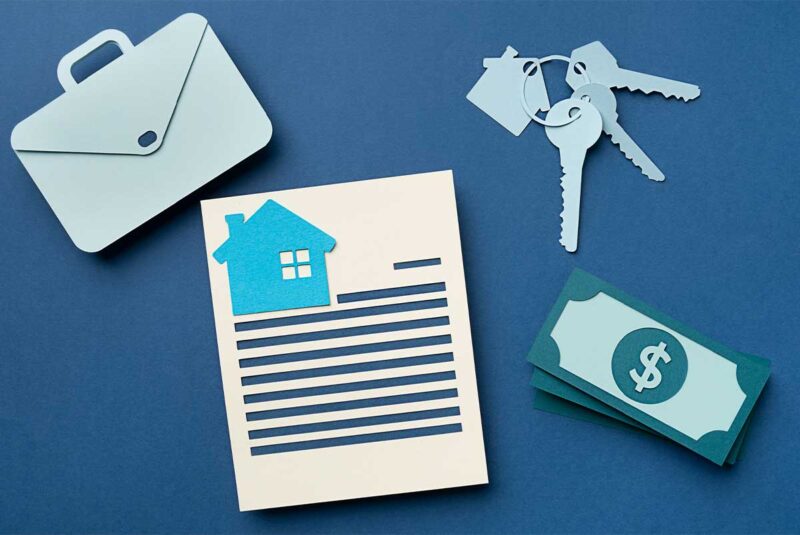Ready To Buy a Home?
Get Approved to Buy a Home
Rocket Mortgage® lets you get to house hunting sooner.
The employment scene looks very different today than it did just a few years ago. And more of us are wondering whether we can get a mortgage or refinance our home loans without a traditional 9-to-5.
In this article, we’ll explain how you can qualify for a mortgage without a job.
Is It Possible To Get a Mortgage if You’re Unemployed?
Yes, you can get a mortgage without a job. It’s pretty common for retirees or people with sources of income that fall outside salaried or hourly full-time jobs.
Getting a mortgage without a job works like getting a mortgage with a job. The biggest difference is documenting how you’ll afford to pay the mortgage. For most of us, a job is the most common source of income. But we know that’s not the only way you can earn money. If you can’t provide lenders with proof of a steady employment history and income, you’ll need to provide them with proof that you can make your monthly mortgage payments.
Your lender has one job: to confirm that you can comfortably repay your loan. Your job will be to give them proof of that.
How To Get a Mortgage Without a Job
When you’re ready to apply for a mortgage, you’ll need to be prepared to confirm your eligibility with the lender.
Here are a few strategies that can help you build your case:
Prepare your case
There’s no escaping it, you’ll need to earn the lender’s trust. Show the lender they should trust you by providing proof that you’re financially stable.
Maybe you’ll be starting a new job soon. Or maybe your profession is seasonal. Whatever the circumstances are, you’re more likely to be approved if you can show your lender you have enough cash reserves to provide income for 8 months of the year, and you can effectively budget to make your monthly mortgage payments for the remaining 4 months.
The key is to be prepared to show a mortgage lender you have a plan in place to make your payments.
If you’re moving for a new job, you may be able to use your job offer letter as proof of employment. Not all lenders will accept an offer letter. Check with your lender to see if they accept offer letters as proof of employment.
Provide proof of all sources of income
Income is money you receive or earn, and it doesn’t always come from an employer. Lenders may accept any of the following as valid sources of income (though some sources may count more than others):
- Child support or alimony payments
- Investment or rental property income
- Retirement income
- Dividend income
Talk to a housing counselor
The Department of Housing and Urban Development (HUD) offers free or low-cost housing counseling services to anyone who needs it. HUD-approved counselors can help you navigate the mortgage process – whether you have a job or not. They can help you craft a budget, create a plan to improve your finances and review which type of mortgage is right for you and your financial situation.
Use the HUD directory to find an approved housing counselor in your area.
Find a co-signer
A co-signer agrees to take on the financial responsibility of repaying a loan if you can’t. If you default on the loan, your co-signer will be on the hook for the balance. That level of risk would explain why co-signers are typically family members or friends.
Use investment income
Some people use money from investments to help them get a mortgage. You can cash out investments to increase your down payment or include investment income statements with your application to demonstrate your ability to repay the mortgage.
Investment income, such as interest or dividends, can be helpful, but due to the unpredictability of most investments, this income isn’t treated the same by lenders and may lead to higher interest rates.
Some investments, like certain annuities, are more stable than others. If you have income from a stable investment, an underwriter may be more willing (and able, under a particular loan’s guidelines), to consider it income to qualify you for a mortgage.
Make a larger down payment
Making a larger down payment on a house can help you get a mortgage when you don’t have a job. The money you put down can show the lender that you’re serious about buying a house and investing in it. It also means you won’t have to borrow as much money, so your monthly mortgage payments will be smaller.
Consider a no-income verification mortgage
No-income verification doesn’t mean you can take out a mortgage without submitting any proof of income. A no-income verification mortgage is another name for a bank statement mortgage, which is a mortgage that doesn’t require a W-2 or employer-based proof of income. No-income verification loans are a go-to for borrowers who are self-employed or whose income is seasonal or commission-based. It may be worth exploring.
But, spoiler, no-income verification mortgages are usually more expensive than traditional loans because of their higher interest rates.
What Lender Application Requirements and Documents Will I Need?
Strong employment histories are the gold standard of income verification, so when you apply for a mortgage without a job, you can expect to be interrogated about your finances.
A lender will decide whether you’re a good candidate for a mortgage based on the information in your application and your financial documents.
When processing mortgage applications, lenders typically look for a healthy credit score and a manageable debt-to-income (DTI) ratio. In addition, you’ll likely need to provide the following information and paperwork:
- Your name
- Your address
- Your date of birth
- Your Social Security number
- An overview of your assets and liabilities
- Tax returns for the past 2 years
- Bank statements for the past several months
- Proof of other income streams, like child support or alimony
- W-2 forms from your employer for the past 2 years (if applicable)
- A list of your debts, including credit card balances and other loans
Refinancing Options for Unemployed Borrowers
When it comes to refinancing a mortgage, there are options available for borrowers who aren’t working.
Conventional loan refinancing
If you want to refinance a conventional loan while you’re unemployed – we won’t sugarcoat it – you’ve got a tough road ahead. But challenging doesn’t mean impossible. There are several ways to refinance a conventional loan – even without a job.
First, you need to get the lender to look past the fact that you aren’t employed. Reassure them that you can repay the loan by recruiting a co-signer or submitting alternative income streams, like alimony or annuities.
But even if a lender is willing to look past the absence of traditional income, you’ll still need a qualifying credit score and enough equity in your home to qualify.
From this point, you’ll submit your application. Make sure to include anything that supports your ability to repay the loan, including assets, annuities, investments and other sources of money.
Even with all this supporting paperwork, it can still be difficult to get approved without proof of consistent income. That’s where a co-signer comes in. It’s not impossible to refinance a conventional loan without a job, but you’ll boost your chances of success with a co-signer.
Government-Backed loan refinancing
If you’re unemployed and living in a home financed through a government-backed loan, you may have an easier path to refinancing. The government offers several programs that can help make your mortgage payments more affordable.
Let’s take a look at two common refinancing options:
Federal Housing Administration (FHA) Streamline
The FHA Streamline Refinance is a government-sponsored refinance program for FHA loan holders. If you can take advantage of this program, you may be able to lower your monthly mortgage payments.
To qualify for an FHA Streamline Refinance, you’ll need to prove you made on-time payments for the past 12 months. You’ll also need to prove that refinancing will provide a “net financial gain,” meaning the benefit of refinancing will outweigh the expense of refinancing.[1]
Department of Veterans Affairs (VA) Streamline
The VA Streamline is a government-sponsored refinance program for VA loan borrowers. With a VA Streamline Refinance (also known as VA IRRRL), you may be able to lower your interest rate and mortgage payments even without a job because there is no income verification requirement.
To refinance your home with a VA Streamline Refinance, you’ll need to meet three key requirements:
- You have an existing VA loan.
- You certify you’re using the VA IRRRL to refinance your existing VA loan.
- You certify you’re using the VA IRRRL for the home you live in or used to live in.
The VA Streamline also doesn’t require a credit check or home appraisal. So it’s a good loan to take advantage of if you’re unemployed and need to refinance your mortgage.
Should You Get a Mortgage or Refinance Without a Job?
If you’re unemployed and you’re thinking about taking out a mortgage or refinancing an existing mortgage, you can probably make it happen – but there are a few things you’ll need to keep in mind.
Because lenders can’t rely on a steady job as your source of consistent income, if you are approved for a loan, the loan will likely have:
- Higher interest rates
- Stricter approval requirements
- Shorter loan terms
- Larger down payment requirements
- Lower approval amounts
A co-signer may help you get approved for a loan or better loan terms – but proceed with caution if you go this route.
If you can’t make your payments and default on the loan, you’re not the only one who’ll suffer any consequences. Besides being on the hook to repay the loan, your co-signer’s credit score and credit history will take a hit, too.
While you may qualify for a mortgage or a refinance, consider whether it’s the right time to take out or refinance a loan. Instead of refinancing, it may make more sense to sell your home and downsize to something more affordable.
You Can Become a Homeowner Without a Job
Think of it this way, it isn’t the job that gets you the loan, it’s the steady income. As long as you can prove to a lender that you either have a vast sum of money saved up or you make enough steady income from other eligible sources to comfortably afford your loan, you may be able to qualify for a mortgage or refinance your home loan without a full-time j-o-b.
If you go for it, your decision will likely mean paying a higher interest rate, but only you can decide whether it’s worth the cost of acquiring or keeping a roof over your head.
Get approved to buy a home.
Rocket Mortgage® lets you get to house hunting sooner.
The Short Version
- Getting a mortgage without a job works like getting a mortgage with a job. The biggest difference is documenting how you’ll afford to pay the mortgage
- A lender will decide whether you're a good candidate for a mortgage based on the information in your application and your financial documents
- Some ways to get a mortgage without a job are to get a co-signer, use nontraditional income sources or put more money down
U.S. Department of Housing and Urban Development. “Let FHA Loans Help You.” Retrieved January 2023 from https://www.hud.gov/buying/loans




